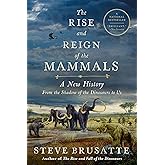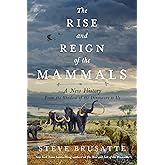We must give Wayne Grady full marks for ambition. When his editor wished to elevate him to "the Canadian David Quammen", Grady upped the ante. He wants to be the "John McPhee" of The Great White North. That's about as lofty as you can get. Does he succeed? Does this book herald a replacement for The New Yorker magazine's eclectic journalist? The topics are varied and interesting. Grady explains them clearly and earnestly, with flashes of dry wit.
In his "First Words" introduction, Grady demonstrates his desire to set new patterns. He notes that this collection relies on his columns in "explore" magazine without simply reprinting old material. He has expanded and updated the original material, sometimes overly restricted in lengths and deadline limitations. These, he says, are essays, not merely retread columns. Further, he wishes to have these essays seen as a "single voice" addressing a "unified theme." The voice is his and the theme is that humanity considers itself detached from the remainder of the world. That, he stresses, is an attitude that must be overcome. The theme, thus, is a reconsideration of where evolution has left our species in the natural order of things.
Technology, in its various forms, has allowed this one species to inhabit nearly all the planet, Grady says. Instead of adapting to the local environment, Homo sapiens has learned how to change its surroundings to suit itself. Agriculture remade land use. Various animals were brought into our communities and put to work or on the table. Darwin's natural selection has been replaced by artificial selection of both plants and animals. More, these technologies now have a global reach and impact. Technology now brings to our table products from Mexico and Africa. Is this innovative practice the result of our sub-tropical origins? Do we need these "exotic" foods to survive?, he asks.
We are going beyond the changing of some species to our design, however. We are eliminating species we deem "harmful" in some way. Killing wolves and coyotes was almost a daily ritual for herdsmen a few years ago. It still is for some. Grady's account of the Harters, a retired couple who chase coyotes with a pick-up and a dog team is stomach-wrenching. Their motive, "It keeps us young" beggars comment. The modern capacity to assign guilt by proximity led to the killing of a cougar suspected of attacking a jogger. It was the wrong cougar. Our desire to limit the world we must cope with goes beyond a few geriatrics chasing coyotes or slaughtering predators until we find the one that may have attacked a human. We are expanding our denial of life's diversity into government policy. Grady quotes his hero: "Nature has become an enemy of the state". Grady wants at least an armistace, if not a peace.
Grady isn't contending we give up the benefits our evolved intellect has granted us. His articles on health and dealing with natural threats show his broad approach. It's not a return to our primitive roots he seeks, but the application of some common sense. He also knows that won't be forthcoming unless we are informed about the world around us. He's like his idol in that sense. Has Grady achieved his goal of using nature writing to become the northern equal to McPhee? His thinking certainly places him close, even if his stylistic abilities fall slightly short. And it's Grady's knowledge of and depiction of the issues that make this book valuable. If he's fallen short, it's not for want of trying or talent. [stephen a. haines - Ottawa, Canada]

Download the free Kindle app and start reading Kindle books instantly on your smartphone, tablet, or computer - no Kindle device required.
Read instantly on your browser with Kindle for Web.
Using your mobile phone camera - scan the code below and download the Kindle app.

Bringing Back The Dodo: Lessons In Natural And Unnatural History Hardcover – International Edition, March 28, 2006
by
Wayne Grady
(Author)
Sorry, there was a problem loading this page. Try again.
A penetrating book on the very roots of our relationship with nature.
Bringing Back the Dodo is about how the forces of evolution and extinction have shaped the living world, and the part that humans play therein. This strikingly thought-provoking book, in the tradition of John McPhee and David Quammen, explores the very roots of our relationship with nature and challenges us to look at ourselves and the natural world around us in new light.
Wayne Grady searches our history and prehistory to explain why humans love nature and fear it at the same time. He explores the repercussions of our manipulations of nature through science, as exemplified by the Harvard Mouse, and suggests which extinct species we could clone (sadly, probably not the dodo), and whether we ought to try. He looks into the ramifications of getting up on our hind legs to walk, and what it meant to humankind when we lost our nocturnal vision. A visit to the supermarket leads him to uncover our vestigial longing for subtropical foods, and elsewhere he ponders how our instinct for “home” compares to that of other animals.
These elegant and penetrating essays, based on pieces originally published in Explore magazine, linger long in the imagination. They speak to some of our most fundamental questions about the human and animal worlds, and confirm Wayne Grady’s standing as one of our foremost literary science writers.
Bringing Back the Dodo is about how the forces of evolution and extinction have shaped the living world, and the part that humans play therein. This strikingly thought-provoking book, in the tradition of John McPhee and David Quammen, explores the very roots of our relationship with nature and challenges us to look at ourselves and the natural world around us in new light.
Wayne Grady searches our history and prehistory to explain why humans love nature and fear it at the same time. He explores the repercussions of our manipulations of nature through science, as exemplified by the Harvard Mouse, and suggests which extinct species we could clone (sadly, probably not the dodo), and whether we ought to try. He looks into the ramifications of getting up on our hind legs to walk, and what it meant to humankind when we lost our nocturnal vision. A visit to the supermarket leads him to uncover our vestigial longing for subtropical foods, and elsewhere he ponders how our instinct for “home” compares to that of other animals.
These elegant and penetrating essays, based on pieces originally published in Explore magazine, linger long in the imagination. They speak to some of our most fundamental questions about the human and animal worlds, and confirm Wayne Grady’s standing as one of our foremost literary science writers.
- Print length240 pages
- LanguageEnglish
- PublisherMcClelland & Stewart
- Publication dateMarch 28, 2006
- Dimensions5.7 x 0.9 x 8.4 inches
- ISBN-100771035047
- ISBN-13978-0771035043
The Amazon Book Review
Book recommendations, author interviews, editors' picks, and more. Read it now.
Book recommendations, author interviews, editors' picks, and more. Read it now.
Frequently purchased items with fast delivery
Page 1 of 1 Start overPage 1 of 1
Editorial Reviews
About the Author
Wayne Grady’s eight books of non-fiction include The Dinosaur Project, The Quiet Limit of the World, Chasing the Chinook, and The Bone Museum. He is also a prolific magazine writer, an equally prolific editor of Canadian travel, fiction, and nature writing, and the translator of many French authors into English, including Antonine Maillet and Herménégilde Chiasson. His most recent book, the bestselling Tree: A Life Story, was written in collaboration with David Suzuki. Wayne Grady lives near Kingston, Ontario.
Excerpt. © Reprinted by permission. All rights reserved.
Generally speaking, in these essays I seem to be constantly alarmed at our tendency to ignore or deny the degree to which we are part of the natural world. I believe it is true that, as J.F. Blumenbach, the nineteenth-century founder of anthropology, first observed, we are “the most perfect of all domesticated species.” Many of these essays are ruminations about what that means. But we have not taken nature out of ourselves — even the most domesticated cat eats, drinks, breathes, hunts, hosts fleas, and reproduces — rather, we have taken ourselves out of nature. To our cost. In many of the essays I try to remind us of the fact that when we destroy a segment of nature — by cutting down a forest to make a road, or killing wild animals for sport, or even ridding ourselves of pests and parasites — we destroy an essential part of ourselves. When we tamper with nature, by altering an organism’s genetic makeup to produce a new plant or animal, or bypass sexual reproduction through cloning or gene splicing, when we remove a species from or add a species to an ecosystem, we are interfering with a process that has evolved on its own, and which has taken us into account, for millions of years, and about which we know next to nothing. It ought to be a sobering thought that, when most of us encounter a bear in the forest, the bear knows more about us than we know about it.
I am not, however, a polemicist by nature. My inclination is simply to point out what we’re doing as a species, place that action in some kind of natural context, and occasionally ask why we persist in doing it. If the voice sometimes sounds plaintive, or incredulous, or impatient, well, that is often the voice of the essayist. An essay is a pearl that began with an irritating grain of sand.
I am not, however, a polemicist by nature. My inclination is simply to point out what we’re doing as a species, place that action in some kind of natural context, and occasionally ask why we persist in doing it. If the voice sometimes sounds plaintive, or incredulous, or impatient, well, that is often the voice of the essayist. An essay is a pearl that began with an irritating grain of sand.
Product details
- Publisher : McClelland & Stewart
- Publication date : March 28, 2006
- Edition : First Edition
- Language : English
- Print length : 240 pages
- ISBN-10 : 0771035047
- ISBN-13 : 978-0771035043
- Item Weight : 14.4 ounces
- Dimensions : 5.7 x 0.9 x 8.4 inches
- Customer Reviews:
Customer reviews
5 out of 5 stars
5 out of 5
1 global rating
- 5 star4 star3 star2 star1 star5 star100%0%0%0%0%100%
- 5 star4 star3 star2 star1 star4 star100%0%0%0%0%0%
- 5 star4 star3 star2 star1 star3 star100%0%0%0%0%0%
- 5 star4 star3 star2 star1 star2 star100%0%0%0%0%0%
- 5 star4 star3 star2 star1 star1 star100%0%0%0%0%0%
How customer reviews and ratings work
Customer Reviews, including Product Star Ratings help customers to learn more about the product and decide whether it is the right product for them.
To calculate the overall star rating and percentage breakdown by star, we don’t use a simple average. Instead, our system considers things like how recent a review is and if the reviewer bought the item on Amazon. It also analyzed reviews to verify trustworthiness.
Learn more how customers reviews work on AmazonTop reviews from the United States
There was a problem filtering reviews. Please reload the page.
- Reviewed in the United States on August 28, 2006












